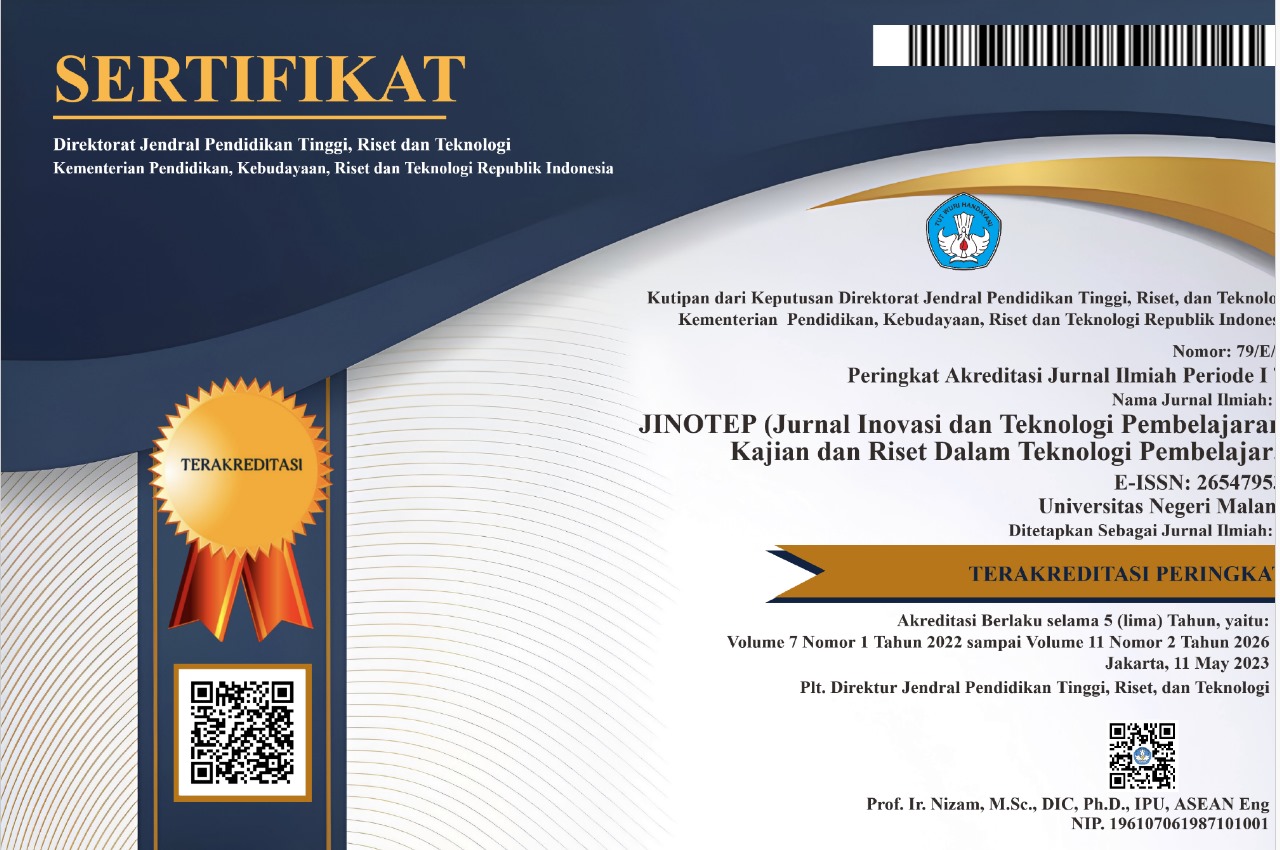Penerapan Scientific dan Cooperative Learning dengan Quis Online untuk Meningkatkan Hasil Belajar Siswa Sekolah Dasar
Abstract
Abstrak: Pada penelitian ini peneliti menggabungkan Scientific dan Cooperative Learning kemudian mengolaborasikannya dengan aplikasi pembelajaran Quizizz dalam meningkatkan hasil belajar siswa. Metode dalam penelitian ini adalah PTK yang terdiri dari perencanaan, pelaksanaan, pengamatan, dan refleksi. Pada penelitian yang dilaksanakan di SDN 003 Sungai Kunjang peneliti menyimpulkan bahwa dengan menggunakan Scientific, Cooperative Learning, dan aplikasi pembelajaran Quizizz dapat mengatasi masalah pembelajaran serta meningkatkan kualitas pembelajaran. Hasil belajar pada kompetensi pengetahuan dari siklus 1 dengan persentase 70% dan siklus 2 85%. Dengan nilai rata-rata kelas diakhir siklus 1 dan siklus 2, masing-masing dengan nilai 75 dan 83. Pada observasi aktivitas siswa dengan aspek partisipasi dan kelengkapan fasilitas android didapatkan hasil pengamatan 87% dan 97% siswa mendapatkan hasil yang baik. Dari penelitian ini didapatkan sebuah kesimpulan bahwa ketika siswa mengalami proses yang benar dan maksimal maka hasilnya pun menjadi maksimal.
Abstract: In this research, researchers combine Scientific and Cooperative Learning and then collaborate with Quizizz learning apps to improve student learning outcomes. The method in this study is CAR consisting of planning, implementation, observation, and reflection. In a study conducted at SDN 003 Sungai Kunjang Researchers concluded that using Scientific, Cooperative Learning, and Quizizz learning applications can solve learning problems and improve learning quality. The results learned on the competency of knowledge from Cycle 1 with a percentage of 70% and a cycle of 2 85%. With the average class value at the end of Cycle 1 and cycle 2, each with a value of 75 and 83. In observing the activity of students with aspects of participation and completeness of Android facilities obtained 87% observation and 97% students get good results. From this study came a conclusion that when students experience a correct and maximal process, the result becomes maximal.
Keywords
Full Text:
PDFReferences
Adianto, S., Widya, U., & Mahakam, G. (2018). Samsul Adianto . 3(3), 200–210. google schoolar.
Alghamdy, R. Z. (2019). EFL Learners ’ Reflections on Cooperative Learning : Issues of Implementation. Theory and Practice in Language Studies, 9(3), 271–277.
Aqib, Zainal, 2009, Penelitian Tindakan Kelas. Jakarta: Bumi Aksara.
Arifin, Zainal. 2011. Metode Penelitian Kualitatif, Kuantitatif, Dan R & D. Bandung: ALFABETA.
Arikunto, Suharsimi. 2009, Peneltian Tindakan Kelas. Jakarta: Bumi aksara.
Chuang, P. J., Chiang, M. C., Yang, C. S., & Tsai, C. W. (2012). Social networks-based adaptive pairing strategy for cooperative learning. Journal of Educational Technology & Society, 15(3), 226-239.
Daryanto. 2014. Pendekatan Pembelajaran Saintifik Kurikulum 2013. Yogyakarta: Penerbit Gava Media.
Depdiknas. Permendikbud, No. 81A tahun 2013.
Dewi, A. E. A., & Mukminan, M. (2016). Implementasi pendekatan saintifik dalam pembelajaran ips di middle grade SD Tumbuh 3 Kota Yogyakarta. Jurnal Prima Edukasia, 4(1), 20-31.
Dini Aria Farindhani dan Muhammad Nur Wangid, (2019). “Scientific-based pictorial storybook with project-based learning method for improving the critical thinking skills of elementary school students” Jurnal Prima Edukasia, 7 (1), 2019, 94-105.
Essien, A. M. (2015). Effectiveness of cooperative learning methodology in improving students ’ learning attitudes towards English language. International Journal of Arts & Sciences, 08(02), 119–127.
Fithriyyati, N., & Maryani, I. (2018). Science lesson plan evaluation for 7th grade secondary school: A learning process reflection. Psychology, Evaluation, and Technology in Educational Research, 1(1), 9-18.
Fogarty, R. (2009). How to integrate the curricula. Corwin.
Grenier, M., Dyson, B., & Yeaton, P. (2005). Cooperative learning that includes students with disabilities. Journal of Physical Education, Recreation & Dance, 76(6), 29-35.
Hastuti, R. P., & Muhari, M. (2017). Increasing Procedure Text Reading Comprehension by using the Saintific Approach of Pictural Media for Students with Hearing Impairment. Jurnal Penelitian dan Pengembangan Pendidikan Luar Biasa, 4(2), 96-104.
Hasyim, F. (2019). Cooperative Learning Approach to an English Academic Reading Course. Script Journal: Journal of Linguistics and English Teaching, 4(2), 147-160.
Hosnan, M. 2014. Pendekatan Saintifik dan Kontekstual dalam Pembelajaran Abad 21. Bogor: Ghalia Indonesia.
Johnson, D., Johnson, R., & Stanne, M. 2000, Cooperative Learning Methods: A Meta-Analysys.
Karar, E. E., & Yenice, N. (2012). The investigation of scientific process skill level of elementary education 8th grade students in view of demographic features. Procedia-Social and Behavioral Sciences, 46, 3885-3889.
Köse, S., Şahin, A., Ergü, A., & Gezer, K. (2010). The Effects Of Cooperative Learning Experience On Eighth Grade Students'achievement And Attitude Toward Science. Education, 131(1).
Maulidina, M. A., Susilaningsih, S., & Abidin, Z. (2018). Pengembangan Game Based Learning Berbasis Pendekatan Saintifik Pada Siswa Kelas IV Sekolah Dasar. JINOTEP (Jurnal Inovasi dan Teknologi Pembelajaran) Kajian dan Riset dalam Teknologi Pembelajaran, 4(2), 113-118.
Nurhidayat, B., Wedi, A., & Praherdhiono, H. (2020). Pengembangan Multimedia Mobile Learning Berbasis Smartphone Android Materi Huruf Madura untuk SD Negeri 1 Perante Kabupaten Situbondo. JINOTEP (Jurnal Inovasi dan Teknologi Pembelajaran): Kajian dan Riset Dalam Teknologi Pembelajaran, 6(2), 103-110.
O’Byrne, W. I. (2016). Four steps to conducting action research in the classroom.
Ojose, B. (2008). Applying Piaget's theory of cognitive development to mathematics instruction. The Mathematics Educator, 18(1).
Setiawan, A., Wigati, S., & Sulistyaningsih, D. (2019). Implementasi media game edukasi quizizz untuk meningkatkan hasil belajar matematika materi sistem persamaan linear tiga variabel kelas x ipa 7 sma negeri 15 semarang tahun pelajaran 2019/2020. Edusaintek, 3.
Sani, I. K., & Kurinasih, I. (2014). Sukses Mengimplementasikan Kurikulum 2013. Jakarta: Kata Pena
Sinambela, P. N. (2017). Kurikulum 2013 dan implementasinya dalam pembelajaran. Generasi Kampus, 6(2), 17-29.
Yu, Y. (2019). The Research on Cooperative Learning in English Reading Teaching in College. Theory and Practice in Language Studies, 9(6), 678–687.
Zhao, F. (2019). Using Quizizz to Integrate Fun Multiplayer Activity in the Accounting Classroom. International Journal of Higher Education, 8(1), 37-43.
DOI: http://dx.doi.org/10.17977/um031v7i12020p057
Refbacks
- There are currently no refbacks.
Copyright (c) 2020 Samsul Adianto

This work is licensed under a Creative Commons Attribution-ShareAlike 4.0 International License.
======================================================================
Jurnal Inovasi dan Teknologi Pembelajaran published by Universitas Negeri Malang in collaboration with the Asosiasi Program Studi Teknologi Pendidikan Indonesia (APS TPI) and Ikatan Profesi Teknologi Pendidikan Indonesia (IPTPI) with a MoU.
Publisher Address:
Educational Technology Laboratorium, Building D5, 1st Floor
Faculty of Education, Universitas Negeri Malang
Semarang St. No. 5, Malang City, East Java Province, Postal Code 65145
Email: jinotep.fip@um.ac.id
======================================================================

JINOTEP is licensed under a Creative Commons Attribution-ShareAlike 4.0 International License.
JINOTEP Statistics (Since July 13th, 2020)


.png)




.png)
1.png)
1.png)
4.png)
2.png)
1.png)
1.png)
.png)


_3.png)





1.png)
.png)